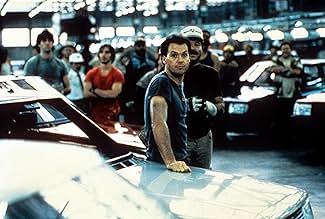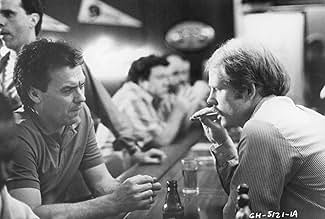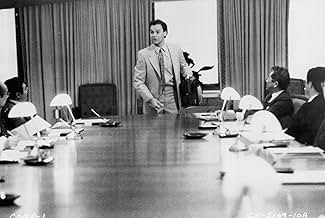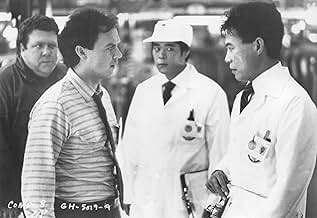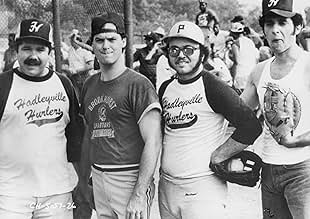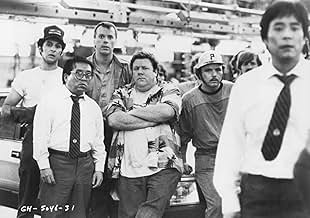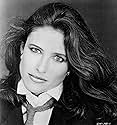Aggiungi una trama nella tua linguaWhen a Japanese automobile company buys an American plant, the American liaison must mediate the clash of work attitudes between the foreign management and native labor.When a Japanese automobile company buys an American plant, the American liaison must mediate the clash of work attitudes between the foreign management and native labor.When a Japanese automobile company buys an American plant, the American liaison must mediate the clash of work attitudes between the foreign management and native labor.
- Regia
- Sceneggiatura
- Star
- Premi
- 1 vittoria in totale
- Mr. Sakamoto
- (as Soh Yamamura)
- Umeki Kazihiro
- (as Patti Yasuiake)
Recensioni in evidenza
Directed by Ron Howard, the film is about a Japanese car company that decides to buy up a shuttered American car factory in a town where it was the major source of employment. There is friction because of the numerous cultural/work culture differences between the Japanese management and the American workers. The main work problem is that the Japanese think "team" and the American workers on the line are individualists. Michael Keaton stars as Hunt Stevenson, who is promoted to liason between the American workers and the Japanese management. His problem is that he doesn't want to tell the unvarnished truth to the workers, and this gets him into trouble when he tells a lie he just can't take back that could mean the end of the plant. Gedde Watanabe plays the Japanese manager of the plant who is trying to go against his nature of caring about the home life of the workers and be "tough" so that the factory will be considered a success by the CEO back in Japan. Eventually he and Hunt form a friendship of sorts.
George Wendt of "Cheers" fame plays a worker who gets demoted to janitor. John Turturro is practically unrecognizable as another factory worker in a small part before the Coen brothers discovered him. If Ron Howard is directing then Clint Howard is not far away, usually playing a bit part, and that is true here too. Oh, if you are expecting the Michael Keaton of Birdman and Spotlight, then you are in for a surprise. This is the rather smart mouth character Keaton started out playing in the early 80s. Think of Bill Blazejowski of 1982's "Night Shift" (also directed by Ron Howard) but with a much bigger I.Q.
Why is this a time capsule and will probably be hard for you to find? When the American workers get angry they refer to their Japanese bosses with terms such as "rice a roni". Also, when Michael Keaton goes up to see the boss he refers to his Japanese secretary as "sugar puss". He isn't flirting, but that still would never make the grade in an American film today. George Wendt's character gets drunk and basically bullies and harasses the big boss' wife in a supermarket one day. Everybody just writes the episode off as the guy being angry about his demotion, as though that is acceptable behavior! It's just funny to have seen this in the theater back in 1986 and realize how much times have changed.
I'd recommend it as a great look back and as a comedic take on some of the economic issues confronting Americans in the 1980s. That decade was not as prosperous and carefree as you might have been led to believe.
There is plenty of comedy relief in the film, from culture clashes to slapstick humor. There's also bits of heroism in the film, including Hunt's town's survival being contingent on the car company staying afloat and including Japanese company manager Oishi Kazihiro (Gedde Watanabe) showing honor to his boss, colleagues and family in getting the car making job done.
Overall, an entertaining film with touches of Americana and Japanese cultures.
Grade B+
Director Ron Howard makes light-hearted fun from a difficult subject matter. For the most part, it works for me. It can be off-putting for an audience that is either pro or anti-union. Howard essentially splits the difference by having both workers and management come together in a happy ending. Michael Keaton is fun. He faces the challenge with charm. Another director would make this a tougher movie but Howard is not that guy.
Not having seen this film until recently, I saw another aspect of it - satire. But it seems not to have been so obvious to others. I can't find anything on the Web that says director Ron Howard intended "Gung Ho" as a satire. So, one doesn't know if he planned it that way or not. What one is left with is a typical comedy of the late 20th century. It lampoons people, places and things in the name of comedy.
So, what to make of "Gung Ho" as a comedy -- or satire? It's crude, it highly exaggerates, and it portrays bigotry. But, portraying bigotry is not the same as being bigoted. Especially where the film lampoons aspects of both Japanese and Americans, their respective cultures of the time, and their work ethics.
And, with that, the film clearly throws political correctness to the wind. For the most part, lampooning PC is good and healthy because it had been carried to such extremes by the end of the last century. The specter of a "thought police" loomed in the future. So, PC itself often clashes with aspects of freedom and liberty, as well as common sense.
Of course, the idea of devotion to the company above all else makes industry a god. And the film clearly shows how the humanity of mankind suffers then, in the families and social structure. I like the undertone of this plot that compares individualism with team work. It points out the strengths of both, and their shortcomings. Its conclusion is very appropriate for a healthy - and happy, society.
If one can see the offsetting poking of fun at the Americans and Japanese in this film, a little lesson emerges about the need for society to get along, and to accept and appreciate our many differences. There's a little of the ugly American in here in George Wendt's meanness with the Japanese manager's wife in the super market. But there's also a depiction of American failure. Again, Wendt's character, Buster, is the source when he argues with a Japanese supervisor on the auto assembly line about allowing occasional flaws to go through. That, indeed, was a striking difference that was at the heart of the Japanese recovery from World War II.
I don't know if anyone connected with this film in 1986 was familiar with that history and how the Japanese industrial supremacy came about. It started in 1950 with a Wyoming-raised American statistician and engineer by the name of W. Edwards Deming. I was fortunate to have attended a talk by Deming in the early 1970s in Washington, D.C., when he related his work with the Japanese to help their industries and economy recover after the war. For his mostly non-scientific members of the audience, Deming kept it very simple. I can never forget his ball bearings example. It was based on his actual statistical studies.
It went something like this. For every 1,000 steel ball bearings that American car makers had been using for wheels, three would be defective. They might be flattened and not perfectly rounded from a flaw at the ball bearing plant. Most wheel bearings will last 100,000 miles or more. But those cars that got wheels with faulty bearings would have wheel problems after just a few thousand miles. Deming used this example with Japanese companies to convince them to single source their suppliers and use zero defects checking up front. By applying this and other principles he used, the Japanese auto industry soon eliminated early car operating problems in all areas.
The result was automobiles that were far more efficient, trouble-free and well made than American cars that had held market sway for decades. Since the early 1980s, Japanese autos have set the standards for quality and workmanship. American and European car makers have been playing catch-up ever since.
So, there's considerably more to this film than a slangy, mocking comedy. One suspects that the director and writers knew and intended that all along. But, packaging it the way they did, it would have some appeal as raw and crude comedy that was something of a fad among many - but not all, movie buffs of that time.
As the reviewers to date indicate - indeed, as with many movies, some viewers may like "Gung Ho" while others may think it's quite bad. Those who haven't yet watched it and may be considering it, should take these things into account.
The last thing that should be mentioned as worthy of note is the acting. There's nothing above average by the American actors -- except for Michael Keaton. He nails the character of Hunt Stevenson, whether one likes him or not. And, Gedde Watanabe is superb as the perplexed, conflicted plant manager, Oishi Kazihiro. Most in the Japanese cast are very good.
Had this movie been made more clearly as a satire, it could have been very enjoyable and entertaining. By thus quashing its otherwise bigoted tone, it could have earned a couple more stars than the six I give it.
Here are some favorite lines. . Hunt Stevenson, "You know, the amazing thing is, I'm not even nervous." Audrey, "Babe?" Stevenson, "Yeah?" Audrey, "You just put your garbage in my car."
Oishi Kazihiro, "You're right! You're right!" Hunt Stevenson, "I am? Are you shittin' me?" Kazihiro, "No. You are in much more trouble than me. Ah ha, ha, ha. I feel much better."
Oishi Kazihiro, after Hunt follows him into the river, "I'm not drowning myself. I'm just freaking out."
Lo sapevi?
- QuizAccording to Bloomberg Businessweek, Toyota executives later used the movie as an example of how not to manage Americans.
- BlooperWhen Hunt Stevenson meets the Japanese managers for the first time, they hand their business cards over with one hand. Japanese business protocol requires formally presenting business cards, holding them with both hands.
- Citazioni
Hunt Stevenson: If you walk out that door, you're going to miss a great comeback. We're ready to roll here, Jack.
Mr. Sakamoto: This will never be like a Japanese factory... *Jack.*
Hunt Stevenson: Oh, yeah? You're right. You know what else? So what?
Mr. Sakamoto: You failed.
Hunt Stevenson: Really? Wanna know something? I got one of the first cars ever made here. I got *the* first car ever - I don't think I want it anymore. As a matter of fact, here.
[hands keys to Mr. Sakamoto]
Hunt Stevenson: Why don't you take the keys, okay? I'd rather have one of those cars.
[points to cars in assembly line]
Hunt Stevenson: I'd rather have one of these cars that *we* made *together,* by hand. Your guys and my guys, together. You know why? Because those cars stand for something. Those cars stand for something pretty great. I'm proud of those cars. I'm taking one.
[Turns to workers]
Hunt Stevenson: Gentlemen, I'm going home in my new car!
[All workers cheer and applaud, then silently pray that Hunt's new car has a working engine. Hunt starts the car, and the workers cheer. However, the car literally falls apart after about two yards, and the workers start to moan. Hunter gets out of the car]
Hunt Stevenson: I tell ya, I thought it handled great!
- Versioni alternativeSome international editions distributed by Paramount on DVD, reduced the aspect ratio from original 2.39:1 to 2.09:1.
- ConnessioniFeatured in Generation X: The Power of Disruption (2016)
- Colonne sonoreDon't Get Me Wrong
Written by Chrissie Hynde
Performed by The Pretenders
Produced by Jimmy Lavine and Bob Clearmountain
Courtesy of Sire Records Company
I più visti
- How long is Gung Ho?Powered by Alexa
Dettagli
Botteghino
- Budget
- 18.000.000 USD (previsto)
- Lordo Stati Uniti e Canada
- 36.611.610 USD
- Fine settimana di apertura Stati Uniti e Canada
- 7.170.830 USD
- 16 mar 1986
- Lordo in tutto il mondo
- 36.611.610 USD
- Tempo di esecuzione1 ora 52 minuti
- Colore
- Proporzioni
- 2.35 : 1
Contribuisci a questa pagina



